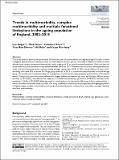Trends in multimorbidity, complex multimorbidity and multiple functional limitations in the ageing population of England, 2002–2015
Abstract
This study aimed to estimate the prevalence of three measures of multimorbidity among people aged 50 years or older in England. Beside the basic measure of two or more diseases within a person, we added a measure of three or more affected body systems (complex multimorbidity) and a measure of 10 or more functional limitations. We found that the three health outcomes became more prevalent between 2002 and 2015. They were more common among females than males and were becoming more common among younger age groups. While in 2002, the prevalence of basic multimorbidity overcame 50% from the 70?74 age group upwards, in 2015 it crossed the same threshold in the 65?69 age group. The distribution of multimorbidity and multiple functional limitations were stratified by the amount of household wealth. Multiple functional limitations reflected the largest differences between the most and the least affluent groups (5.9-fold in 2014/2015), followed by the measure of complex multimorbidity (2.8-fold in 2014/2015) and basic multimorbidity (1.9-fold) in 2014/2015.While age acted as a levelling factor for the wealth differences in basic multimorbidity, it had no such effect on the two other outcomes. Our study observed social polarization among multimorbid ageing population in England where complex multimorbidity and multiple functional limitations increase faster and reflect stronger inequality than basic multimorbidity.
Citation
Singer , L , Green , M , Rowe , F , Ben-Shlomo , Y , Kulu , H & Morrissey , K 2019 , ' Trends in multimorbidity, complex multimorbidity and multiple functional limitations in the ageing population of England, 2002–2015 ' , Journal of Comorbidity , vol. 9 . https://doi.org/10.1177/2235042X19872030
Publication
Journal of Comorbidity
Status
Peer reviewed
ISSN
2235-042XType
Journal article
Description
Leo Singer was funded by the School of Environmental Sciences, University of Liverpool, as part of his PhD Studentship.Collections
Items in the St Andrews Research Repository are protected by copyright, with all rights reserved, unless otherwise indicated.

